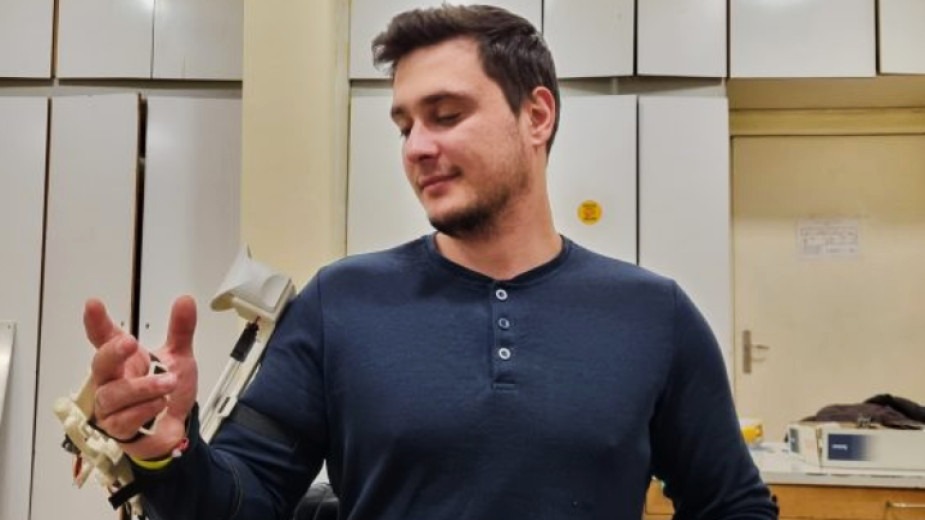A Bulgarian engineer devised a robot that will assist patients who have suffered strokes or have been in an accident. The invention is the work of engineer Petko Stoev who is doing a PhD at the Cyber-Physical Systems department of Institute of Information and Communication Technologies at the Bulgarian Academy of Sciences. He is also co-founder of a startup company for high-tech cyber-physical solutions and products aimed at improving the quality of life. For his cutting-edge invention the young scientist was recently awarded the Entrepreneurs in Science award of the Karoll Knowledge Foundation.

It was Petko Stoev’s childhood dream to be a robotics engineer and to devise products that will help solve different kinds of problems. And the idea to devise a robotic arm came to him after a close friend had a serious accident and was in need of rehabilitation.
The robot is exoskeletal, helping patients regain movement by way of rehabilitation procedures. The robotic arm performs the full range of arm movements for the purposes of rehabilitation, and can be controlled remotely.
What are the benefits of the new Bulgarian cyber invention? Here is the answer from Petko Stoev, who spoke to Alexander Raychev from the BNR’s Hristo Botev channel:
“The most important innovation is that by using this robot, patients and the people in need of rehabilitation after suffering stroke or serious injury with broken limbs, will be able to undergo the rehabilitation needed for a full recovery in the comfort of their own homes, or wherever they feel would be a good place to do so,” Petko Stoev says. “It means rehabilitation anywhere, anytime. When the patient is given such a robot for home use, doctors will be able to act autonomously, using a computer to set the parameters of the control programmes and so, remotely, the patient will be able to undergo rehabilitation at home.”

The Bulgarian invention will also make the process of constant monitoring by a medical professional easier. The system will record data of the procedures that have been carried out, and will send out reports of the progress each patient is making. And one more thing – one doctor will be able to control 5-6 robots remotely at the same time instead of having to treat a patient manually, and will be able to monitor them in real time.
“So that, per unit time, instead of dealing with one patient, the medic will be able to treat many. Our robot offers a solution to the problem of the limited capacity of hospital clinics, eliminating the problem of schedules and the potential of surgeries,” engineer Petko Stoev says.
As work on the robot progressed, a survey was conducted among medical experts in the country and 90% of feedback was positive. The medical professionals said that it will make their work easier and will reduce the risk of occupational diseases among rehabilitators, Petko Stoev says, and adds that the device is currently in the process of being patented and certified. The robot has been given the green light for clinical testing and has undergone laboratory validation.
More:
Interview by Alexander Raychev, Hristo Botev channel, BNR
Compiled and edited by Veneta Nikolova
Photos: karollknowledge.bg, re4life.eu
The Festival of Ancient Heritage "Eagle on the Danube" will carry out its most ambitious edition so far – “The Legions of Moesia”. It will be held from June 13 to 15 at three ancient fortresses on the territory of Pleven district. These are Storgosia..
By decision of the Council of Ministers, the deadline for the implementation of the activities under the National Programme for Polar Studies “From Pole to Pole” 2022-2025" has been extended until the end of 2027, BTA reported. According to the..
Natalia Staykova is a primary school teacher, one of those educators for whom working with children is not just a profession, but a calling. She says that children give her strength and energy. She puts her whole soul and heart into teaching them to..

+359 2 9336 661
